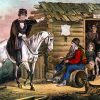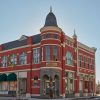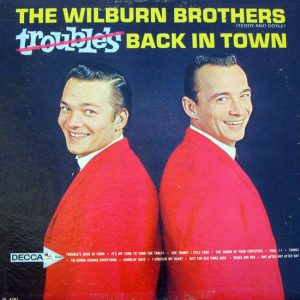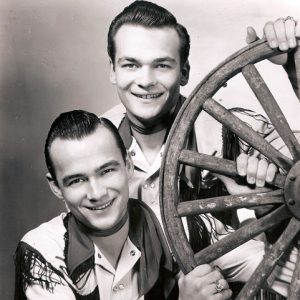calsfoundation@cals.org
Wilburn Brothers
The Wilburn Brothers were among the most successful and influential sibling duos in the country music industry during the 1950s, 1960s, and early 1970s. Brothers Virgil Doyle (“Doyle”) Wilburn (1930–1982) and Thurman Theodore (“Teddy”) Wilburn (1931–2003), who hailed from Hardy (Sharp County), were stars of the Grand Ole Opry, recording artists with over thirty albums, recipients of the only “Lifetime Recording Contract” ever given by Decca Records, and hosts of their own nationally syndicated country music show for eleven years. In addition, they were talent agents who helped launch the careers of many other legendary country music stars, including Loretta Lynn, Patty Loveless, and the Osborne Brothers. Their Surefire Music, formed in 1957, is the only remaining family-owned music-publishing house in Nashville, Tennessee.
Teddy and Doyle Wilburn were the youngest two children of Benjamin (B. E.) “Pop” Wilburn and Katie “Mom” Wilburn. Pop Wilburn was a disabled World War I veteran struggling through the hard times of the 1930s, taking odd jobs to feed his family. One day, he saw a family of performers whose car had broken down; the family paid for the repairs by performing for tips. He subsequently ordered instruments from the Sears and Roebuck catalogue and taught his children to become performers. On December 24, 1937, the Wilburn family children made their first public performance on a street corner in Thayer, Missouri. Teddy and Doyle, along with older brothers Lester Lloyd and Leslie Floyd and sister Geraldine, played and sang with their guitars, mandolin, ukulele, and fiddle for the people who gathered around.
Pop Wilburn took his children to a talent contest in Birmingham, Alabama, being held by the “King of Country Music,” Roy Acuff. They arrived too late for the contest, but Pop placed his children at the stage door exit and waited for Acuff to come out between shows. The children performed one of Acuff’s favorite hymns, leaving him so impressed that he arranged an invitation to the Grand Ole Opry in Nashville. In 1940, after performing as Opry members for six months, the Wilburns were forced to leave due to the child labor laws.
Geraldine Wilburn left the group to marry, but the four brothers continued performing and eventually became cast members of the Louisiana Hayride as well as having their own morning radio show on KWKH. Though the brothers had broken up by the time Doyle and Teddy Wilburn were called to serve in the military during the Korean War, they had been lucky enough to befriend a regionally popular singer named Webb Pierce while working on the Hayride. Pierce eventually became a huge star in Nashville and, after the war, invited Doyle and Teddy Wilburn to join him. The Wilburns realized that a duo act would work better for them than a family group. They honed their skills as a duo while working with future legends Webb Pierce, Faron Young, and Ernest Tubb.
Soon, the Wilburn Brothers were gaining popularity through their records and performances. Some of their best-known songs are “Sparkling Brown Eyes,” “Trouble’s Back in Town,” “Roll Muddy River,” and “Somebody’s Back in Town.” Eventually, they branched out into music publishing and talent management along with partner Don Helms (member of the Steel Guitar Hall of Fame and one of Hank Williams Sr.’s Drifting Cowboys). Brothers Lester and Leslie Wilburn were brought in to help run the many businesses.
In 1964, The Wilburn Brothers show debuted as a nationally syndicated program. On this show, they were able to give mass exposure to a then-little-known singer named Loretta Lynn. When Lynn first came to Nashville, she had sought out the Wilburns to obtain their autographs and to ask if they would listen to her record produced by an independent West Coast label. The Wilburns added Lynn to their road shows, negotiated a deal with Decca Records for her, and later added her as a regular cast member to their show. During the eleven-year run of the show, guests ranged from country music legends to talented, newer artists. Crystal Gayle, Barbara Mandrell, and the Oak Ridge Boys were just some of the young artists that benefited from the exposure early in their careers.
Doyle Wilburn died from lung cancer on October 16, 1982. Teddy Wilburn continued to perform on his own into the early 1990s, when his health forced him to give it up. He died of congestive heart failure on November 24, 2003. In 2008, the Wilburn Brothers were inducted posthumously into the Arkansas Entertainers Hall of Fame.
For additional information:
Ankeny, Jason. “Wilburn Brothers.” Country Music Television. http://www.cmt.com/artists/az/wilburn_brothers/bio.jhtml (accessed February 22, 2022).
Dahl, Bill. Liner notes for the Wilburn Brothers’ Greatest Hits. Varese Sarabande, 2005.
Kitsinger, Otto. Liner notes for the Wilburn Brothers’ Trouble’s Back in Town—The Hits of the Wilburn Brothers. Edsel Records, 1998.
“Opry’s Doyle Wilburn Services Set Tuesday.” Tennessean (Nashville, Tennessee), October 17, 1982, p. 20A.
“Wilburn Brothers.” AllMusic.com. http://www.allmusic.com/artist/the-wilburn-brothers-mn0000820999 (accessed February 22, 2022).
Susan H. Brant
Hernando, Mississippi









Wow! I actually went to Puson, Korea, while I was in the Navy in 1983 during a world cruise. I sure wish I could’ve heard some of their music. It sounds like y’all grew up in a time that is extremely hard to find nowadays anywhere. But thank God there’s still some old-fashioned Americans that love this wonderful music.
My grandfather was their mail carrier in Hardy, Arkansas, where I was born.
I went to school with Doyle and Teddy in the tenth grade at Fountain Lake near Hot Springs, Arkansas. Their dad, Pops, would pick them up at school one day a week and take them to sing on a radio station. I believe the radio station call sign was KCHS in Hot Springs. I think this was in 1949. I considered them good friends. Teddy came with a USO group while I was stationed at K-9 AFB in Pusan, Korea, and performed for us.